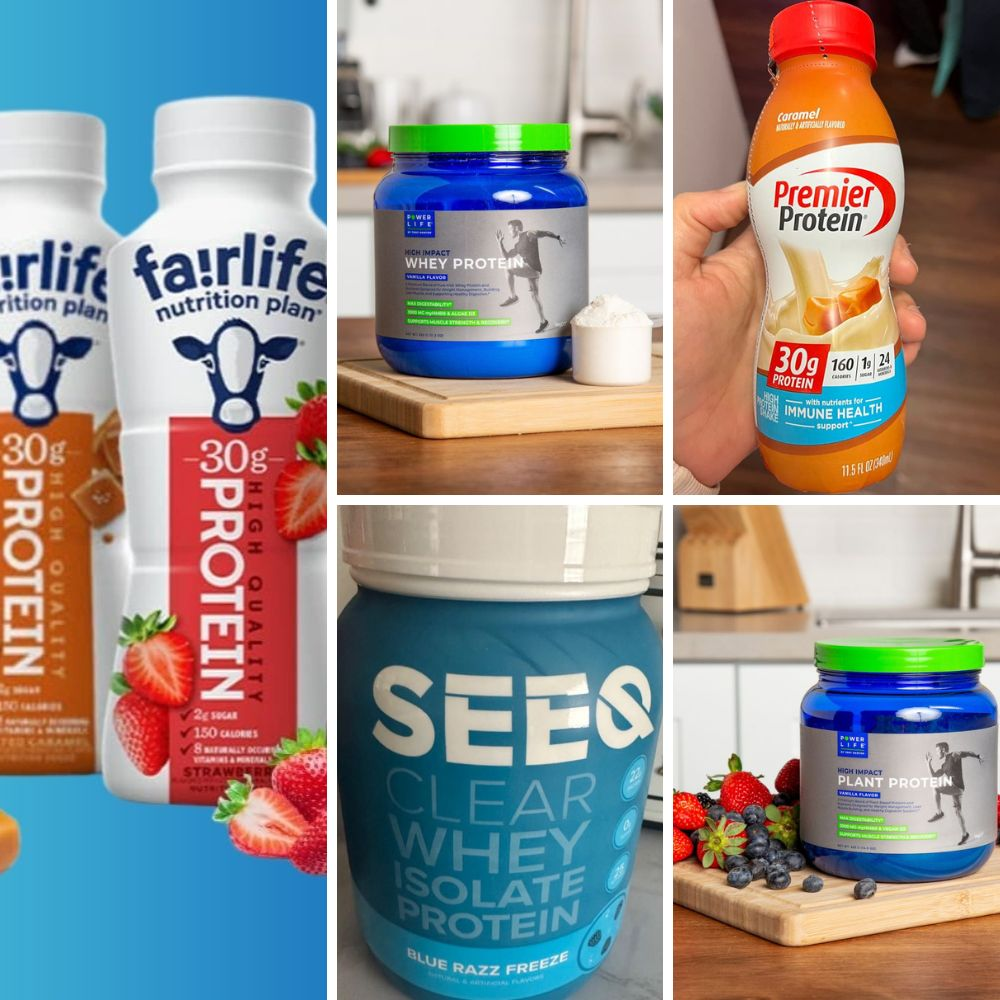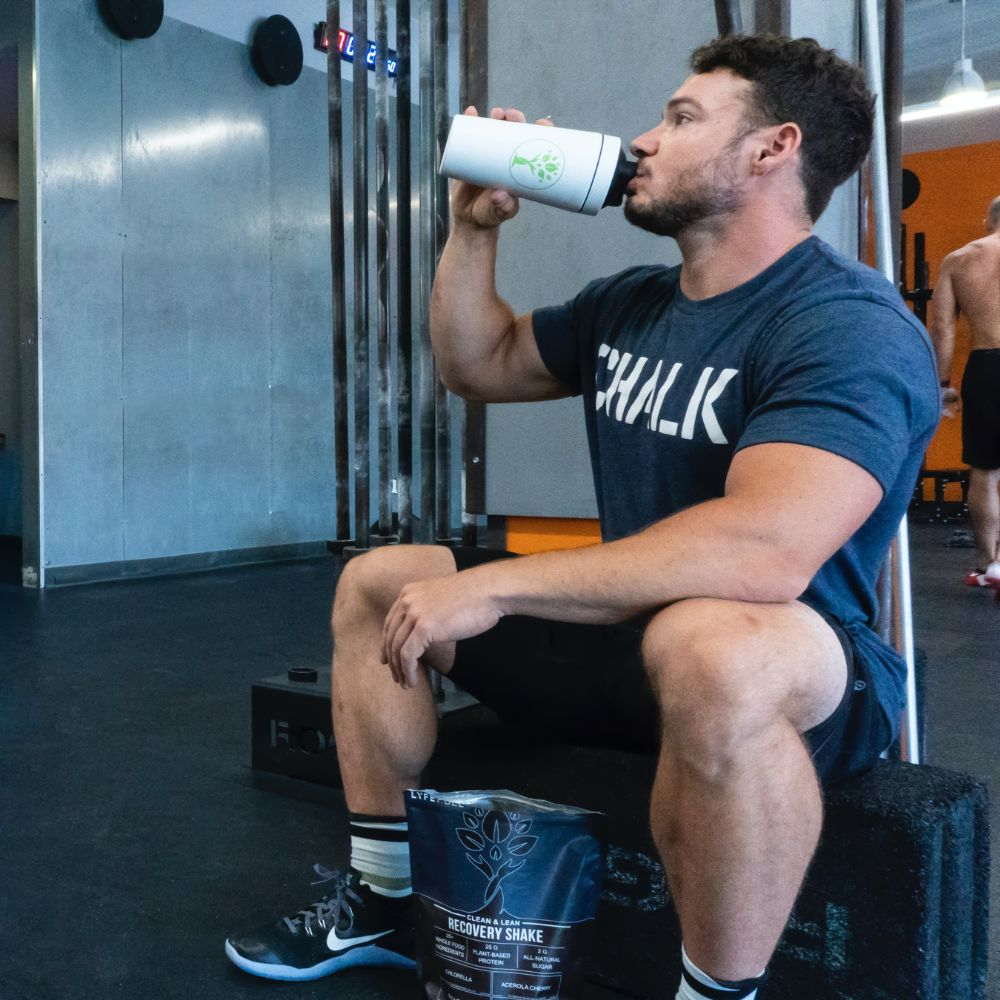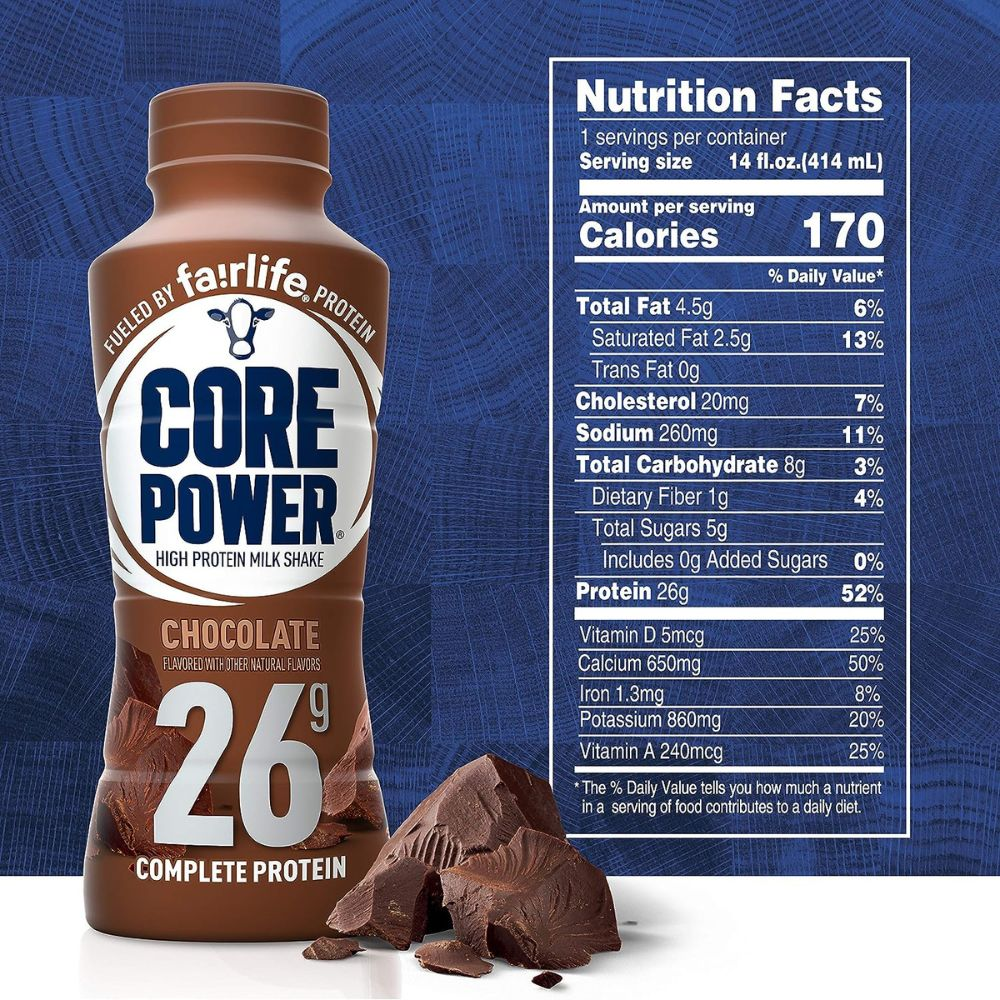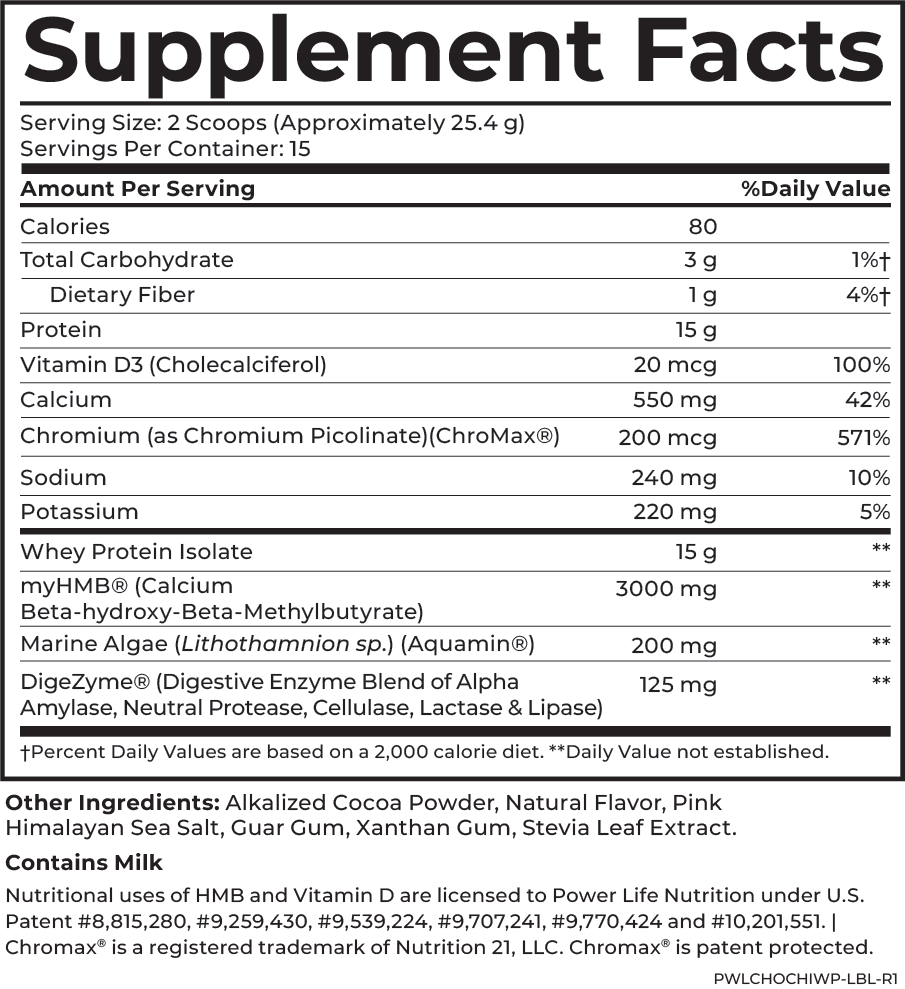Protein is a crucial macronutrient that plays a vital role in our overall health, from muscle growth and repair to hormonal balance. But are you getting enough protein in your daily diet?
With our hectic lifestyles and various dietary restrictions, it can be challenging to meet our protein needs through whole foods alone. That’s where protein shakes come in handy, offering a convenient and efficient way to boost your protein intake.
In this blog post, we’ll delve into the world of protein shakes and uncover the top choices, specifically answering the question: what protein shakes do doctors recommend in 2023?
We’ll explore the benefits of different types of protein shakes, factors to consider when choosing one, and how to incorporate them into your diet effectively. So let’s dive in and discover the power of protein shakes for your health and fitness goals!
Key Takeaways
- Doctors recommend Fairlife Core Power and Dymatize’s ISO 100 Gourmet Vanilla as the top protein shakes to meet dietary needs.
- Factors to consider when choosing a protein shake include: Protein Content per Serving, Added Sugars & Artificial Sweeteners, Dietary Restrictions/Allergies.
- Benefits of consuming protein shakes include aiding weight loss, muscle recovery & growth, postoperative recovery and meal replacement, but should be consumed in moderation with consideration for potential side effects.
Top Protein Shakes Recommended by Doctors

Protein shakes have become increasingly popular as people realize their potential to help meet their protein needs efficiently. There’s a wide variety of protein shakes available, catering to different dietary preferences and requirements, from whey and casein protein derived from milk to plant-based options like pea and pumpkin seed protein.
Protein powders, often used to make these shakes, are recommended by medical professionals for individuals who struggle to get enough protein or have an increased need for protein, such as athletes or those recovering from surgery.
When it comes to the top protein shakes recommended by doctors, Fairlife Core Power and Dymatize’s ISO 100 Gourmet Vanilla are highly regarded as dietary supplements. The forthcoming parts will delve into protein shakes’ varied types, benefits, and their compatibility with different dietary needs.
Whey Protein Shakes
Whey protein shakes are a popular choice among doctors, athletes, and fitness enthusiasts due to their high-quality protein content and essential amino acids. Derived from milk protein concentrate, whey protein shakes provide a range of benefits, including:
- Aiding muscle growth and repair
- Supporting weight management
- Accelerating recovery
- Strengthening the immune system
- Improving nutrient absorption
One example of a whey protein shake recommended by doctors is Orgain’s chocolate fudge-flavored protein shake, which contains 20 grams of protein per serving. Incorporating whey protein shakes into your diet can help you meet your protein needs, fuel your workouts, and support your overall health and wellness goals.
Plant-Based Protein Shakes
For vegans, vegetarians, or those with lactose intolerance or milk allergies, plant-based protein shakes offer a viable alternative to whey protein. These shakes typically use protein sources like organic pea protein, brown rice protein, and chia seeds to provide a nutrient-rich and allergen-free option.
Not only do plant-based protein shakes cater to specific dietary needs, but they also pack a powerful nutritional punch. For example, a plant-based protein shake with pea and pumpkin seed protein provides:
- 20 grams of protein
- All nine essential amino acids
- 30% of the Daily Value of iron
- 5 grams of fiber per serving
Choosing a plant-based protein shake can help you meet your protein requirements while adhering to your dietary preferences and restrictions.
Complete Protein Shakes
Complete protein shakes offer an excellent option for those looking to support muscle growth and overall health. These shakes offer several benefits, including:
- Containing all nine essential amino acids, which are the building blocks of proteins in our bodies
- Facilitating muscle growth and repair
- Supporting weight management
- Providing convenience and easy digestion
- Offering nutrient-richness
- Boasting versatility
Selection of a complete protein shake should be based on factors like protein content per serving, presence of added sugars and artificial sweeteners, and dietary restrictions or allergies. A well-chosen shake helps ensure your body receives the nutrients it needs to thrive.
Factors to Consider When Choosing a Protein Shake

Given the variety of protein shake options, understanding the key factors for selection is vital. These factors include protein content per serving, added sugars and artificial sweeteners, and dietary restrictions or allergies.
By carefully reviewing the ingredient list and nutrition facts panel of a protein shake, you can gain a better understanding of its components and respective quantities. The subsequent sections will delve into these factors in more detail, assisting you in making an informed decision when choosing a protein shake.
Protein Content per Serving
One of the most important factors to consider when choosing a protein shake is the amount of protein per serving. This can range from 10 grams to over 90 grams for powders. The recommended daily protein intake for adults is 0.8 grams of protein per kilogram of body weight, or 0.36 grams per pound.
It is recommended that people engaging in strength or endurance exercise consume 1.2 to 2 grams of protein per kilogram of body weight, which equates to 0.5-0.9 g/lb. Factors such as gender, activity intensity, carbohydrate and calorie intake should also be taken into consideration.
Choosing a protein shake with the right protein content per serving ensures you’re meeting your personal protein requirements.
Added Sugars and Artificial Sweeteners
Another factor to consider when choosing a protein shake is the presence of added sugars and artificial sweeteners. Consuming protein shakes with added sugars and artificial sweeteners may lead to weight gain, an increased risk of heart disease, and potential negative effects on gut health.
It’s important to choose a protein shake with minimal added sugars and artificial sweeteners to ensure you’re consuming a healthy and nutritious option. For example, Quest Nutrition Vanilla Protein Flavored Protein.
Shakes contain no sucrose, but do contain the artificial sweetener sucralose (also known as Splenda). Being aware of these ingredients allows you to choose a protein shake that aligns with your health goals and avoids unwanted side effects.
Dietary Restrictions and Allergies
Finally, when selecting a protein shake, it’s essential to consider any dietary restrictions or allergies you may have. There are protein shake options available to cater to various dietary needs, such as:
- vegan
- lactose-free
- gluten-free
- hypoallergenic
A thorough review of the ingredient list and choosing a protein shake that fits your dietary needs ensures a safe and nutritious consumption. Always consult with a healthcare provider to verify that a protein shake is suitable for your specific needs and restrictions.
Benefits of Protein Shakes

Protein shakes offer a myriad of benefits, making them an attractive option for those looking to boost their protein intake. Some of the benefits of protein shakes include:
- Promoting weight loss
- Supporting muscle recovery
- Providing a convenient meal replacement
- Supporting overall health and fitness goals
In addition to the benefits mentioned above, protein shakes can also assist in post-operative recovery, support immune system function, and improve nutrient absorption. These benefits will be further elaborated in the subsequent sections.
Weight Loss
One of the key benefits of protein shakes is their ability to aid in weight loss. Consuming protein shakes can help create a feeling of satiety, reducing total calorie intake and making it easier to stick to a balanced diet. Additionally, protein shakes can help preserve muscle mass during weight loss, ensuring that you’re losing fat rather than muscle tissue.
Keep in mind, though, that protein shakes should supplement a balanced diet, not replace whole meals. Consuming too many protein shakes or relying on them as your primary source of nutrition can lead to weight gain or other health issues.
Muscle Recovery and Growth
Protein shakes are an excellent source of post-workout nutrition, providing essential amino acids that aid in muscle recovery and growth. Consuming a protein shake within 30 minutes of a strenuous workout or strength session can jump-start the recovery process and support muscle growth, with at least 20 grams of protein being optimal for this purpose.
Adding protein shakes to your post-workout routine ensures your body gets the necessary nutrients for muscle tissue repair and rebuild, while also encouraging muscle protein synthesis for better muscle development.
Meal Replacement and Convenience
For busy individuals, protein shakes offer a quick and easy meal replacement option. While most protein shakes lack the necessary calories, carbohydrates, and fat to serve as a complete meal replacement, they can still provide a convenient and nutrient-dense snack or mini-meal when time is short.
Protein shakes are also a convenient option for individuals who have difficulty meeting their daily protein requirements through whole foods alone. Adding protein shakes to your diet lets you meet your protein goals without spending too much time or energy.
Protein Shakes for Specific Needs

Protein shakes can be tailored to meet the specific needs of various individuals, such as athletes, pregnant and breastfeeding women, and those with dietary restrictions. Choosing a protein shake aligned with your unique needs ensures you receive the requisite nutrients for muscle growth, overall health, and any particular requirements you may have.
In the next few sections, we’ll explore some of these specific needs in more detail, providing recommendations for protein shakes that are best suited to different groups of individuals.
Athletes
Athletes require a higher level of protein intake to support muscle growth, recovery, and performance. Active individuals looking to maintain or increase muscle mass are recommended to take a protein intake of 1.4 to 2.0 grams per kilogram (g/kg) of body weight. This is according to the International Society for Sports Nutrition.
When selecting a protein shake for athletes, it is important to consider the following factors:
- Protein content: Look for a shake that provides an adequate amount of protein to meet your needs.
- Digestibility: Choose a shake that is easily digested and absorbed by the body.
- Balance of essential amino acids: Ensure that the shake contains all the essential amino acids that your body needs for optimal muscle growth and repair.
By considering these factors, you can choose a protein shake that will effectively support your athletic performance and goals.
Popular options for athletes include whey protein, casein protein, protein powder, and plant-based protein shakes, each offering unique benefits and characteristics. To determine the most suitable protein shake for your individual needs, it’s recommended to consult with a nutritionist or dietitian for personalized advice.
Pregnant and Breastfeeding Women
Pregnant and breastfeeding women have increased protein needs to support the health and well-being of both themselves and their babies. Protein shakes can provide essential nutrients that are beneficial for healthy fetal growth, postpartum recovery, and increased milk production.
Before consuming protein shakes during pregnancy or breastfeeding, it’s important to consult with a healthcare provider to verify that the shake is safe and suitable for your specific needs. Ensuring that you’re meeting your increased protein requirements during this crucial time can help support the health and well-being of both you and your baby.
Dietary Restrictions
For individuals with dietary restrictions, such as vegan, vegetarian, lactose-free, or gluten-free diets, protein shakes can provide a convenient and easily digestible source of protein. These shakes can help satisfy protein needs for those who may struggle to consume enough protein through whole foods alone, and they often cater to a range of dietary preferences and restrictions.
When selecting a protein shake for individuals with dietary restrictions, it’s important to carefully review the full list of ingredients to ensure the shake only contains components that are suitable for your specific needs. Choosing a protein shake that aligns with your dietary needs ensures your consumption is both safe and nutritious.
How to Incorporate Protein Shakes into Your Diet

So, you’ve chosen your ideal protein shake; now, how do you incorporate it into your daily routine? While protein shakes can be a valuable addition to a balanced diet, it’s important to remember that they should be used as a supplement to your regular meals, not as a complete meal replacement.
Subsequent sections will discuss optimal timing for protein shake consumption, potential overconsumption side effects, and ways to meet your protein needs healthily and sustainably.
Best Time to Consume Protein Shakes
The ideal timing for consuming protein shakes depends on your individual goals and preferences. For those looking to support muscle recovery and growth, consuming a protein shake within 30 minutes of a strenuous workout or strength session can be beneficial, providing optimal recovery nutrition.
For individuals seeking to lose weight or maintain a balanced diet, protein shakes can be used as a convenient snack or mini-meal throughout the day. It’s essential to remember that overconsumption of protein shakes or using them as your primary nutrition source could result in weight gain or other health complications.
Potential Side Effects and Overconsumption
While protein shakes can offer numerous benefits, it’s important to be mindful of potential side effects and the risks associated with overconsumption. Excessive consumption of protein shakes may result in digestive issues such as bloating, gas, and nausea, and may even lead to weight gain.
Individuals with kidney disease or other medical conditions that restrict protein intake should exercise caution when consuming protein shakes and consult with their healthcare provider before incorporating them into their diet. Moderate consumption of protein shakes within a balanced diet can optimize their benefits while reducing potential risks.
Summary
Throughout this blog post, we’ve explored the world of protein shakes, delving into the top recommendations from doctors, the benefits of different types, and how to choose the best one for your needs.
Whether you’re an athlete, pregnant or breastfeeding, or have specific dietary restrictions, there’s a protein shake out there to help you meet your protein needs and support your overall health and fitness goals.
Remember, protein shakes should be used as a supplement to a balanced diet, not as a complete meal replacement. By incorporating protein shakes into your daily routine at the right times and in the right amounts, you can reap their numerous benefits and support your journey to a healthier, stronger, and more vibrant version of yourself.
Frequently Asked Questions
What protein shakes do dieticians recommend?
Registered dietitians recommend protein shakes like Core Power, Premier Protein, Splenda Diabetes Care, OWYN Balanced, Muscle Milk and Ghost Protein for their excellent nutrition, taste and convenience.
What protein shakes do hospitals use?
Hospitals commonly use protein shakes such as UNJURY and Ensure, which are manufactured in the U.S. under strict quality-controlled conditions. These shakes provide high-quality protein and branched chain amino acids for muscle-building, as well as low sugar for weight loss and glucose management.
They are recommended by doctors as a way to prepare for and recover from surgery.
What is the best protein to drink daily?
For daily use, the best protein to drink is whey protein. It is one of the most commonly used proteins and contains all essential amino acids as well as other beneficial nutrients like energy-boosting components and stress-reducing properties.
Whey isolates and concentrates are great for post-workout recovery.
How much protein should adults consume daily?
For adults, it is advised to consume 0.8 grams of protein per kilogram of body weight, or 0.36 grams per pound, daily.
Are protein shakes suitable as a complete meal replacement?
Protein shakes do not provide enough calories, carbohydrates, and fat to be used as a full meal replacement, but they can serve as a nutritious snack or mini-meal.
Do Fairlife Proten Shakes Help You Lost Weight?













